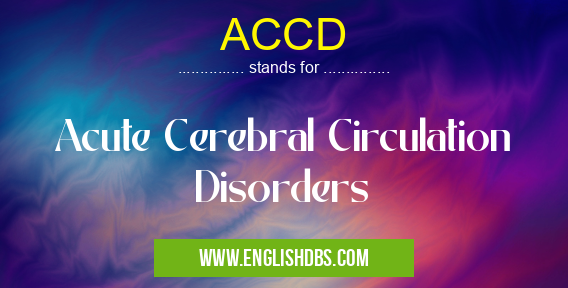What does ACCD mean in UNCLASSIFIED
ACCD (Acute Cerebral Circulation Disorders) encompasses a range of neurological conditions caused by sudden disturbances in blood flow to the brain. These disorders can result in temporary or permanent brain damage, depending on the severity and duration of the disruption.

ACCD meaning in Unclassified in Miscellaneous
ACCD mostly used in an acronym Unclassified in Category Miscellaneous that means Acute Cerebral Circulation Disorders
Shorthand: ACCD,
Full Form: Acute Cerebral Circulation Disorders
For more information of "Acute Cerebral Circulation Disorders", see the section below.
Types of ACCD
ACCD can be classified based on the underlying cause of blood flow disruption:
- Ischemic stroke: Occurs when an artery supplying blood to the brain becomes blocked, causing a lack of oxygen and nutrients to the affected brain tissue.
- Hemorrhagic stroke: Occurs when a blood vessel in the brain ruptures, leading to bleeding within or around the brain.
- Transient ischemic attack (TIA): A temporary disruption of blood flow to the brain that resolves within 24 hours. TIAs are warning signs of a potential future stroke.
Symptoms of ACCD
Symptoms of ACCD can vary depending on the location and extent of the brain damage. Common symptoms include:
- Sudden onset: Symptoms typically appear abruptly without warning.
- Neurological deficits: Weakness, numbness, or paralysis on one side of the body
- Speech problems: Difficulty speaking or understanding speech
- Vision changes: Blurred vision, double vision, or loss of vision in one or both eyes
- Headache: Sudden, severe headache that may be accompanied by nausea and vomiting
- Dizziness or balance problems: Difficulty walking or maintaining balance
Diagnosis and Treatment
Timely diagnosis and treatment are crucial for minimizing brain damage and improving outcomes in patients with ACCD. Diagnosis involves a comprehensive medical history, physical examination, and neuroimaging tests such as MRI or CT scans. Treatment depends on the type of ACCD and may include:
- Stroke unit care: Specialized medical management in a dedicated stroke unit
- Thrombolytic therapy: Medications to dissolve blood clots in ischemic stroke
- Endovascular interventions: Procedures to remove clots or repair damaged blood vessels
- Antiplatelet or anticoagulant medications: To prevent further blood clots or bleeding
- Rehabilitation: Physical, occupational, and speech therapy to help patients regain function
Final Words: ACCD is a serious medical condition that requires immediate attention. Prompt diagnosis and treatment can significantly improve outcomes and reduce the risk of long-term disability. Understanding the symptoms and risk factors of ACCD is essential for early recognition and appropriate medical intervention.
ACCD also stands for: |
|
| All stands for ACCD |
